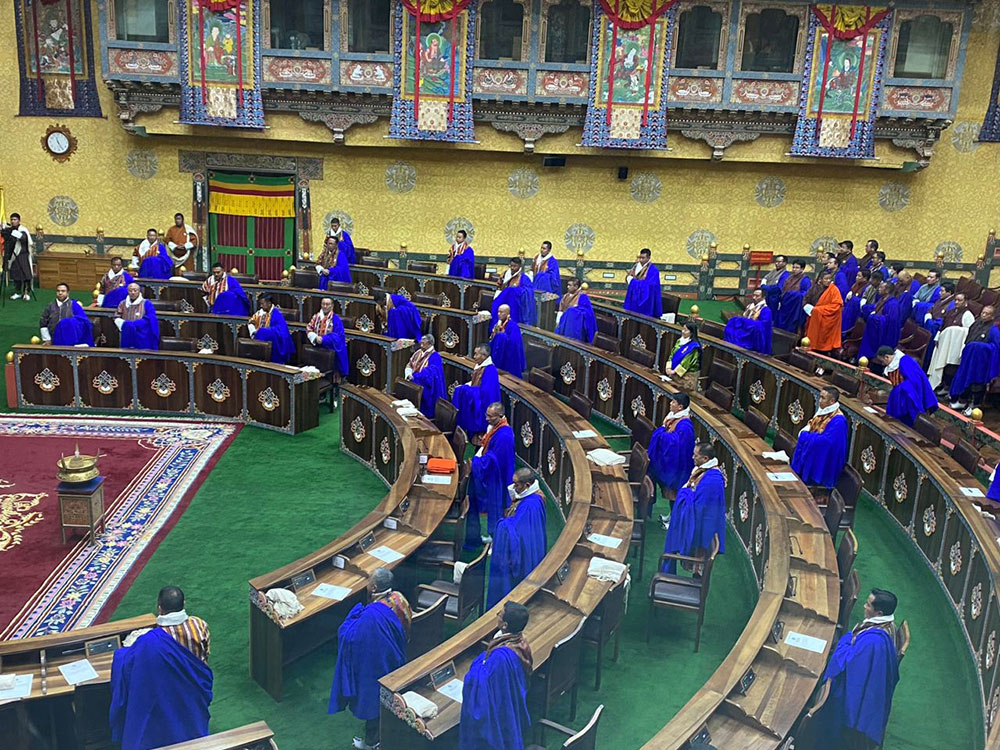… members elect Speaker and Deputy Speaker
Dechen Dolkar
The first session of the fourth National Assembly (NA) convened yesterday, marking the commencement of the new government’s five-year term.
The session began with the symbolic offering of Ku-Sung-Thugten, representing His Majesty The King, and the reading of the Kasho from the Druk Gyalpo by the Secretary General. The Chief Justice of Bhutan, Chogyal Dago Rigdzin, administered the oath of office to the Members of Parliament, organised according to their age. The members were also seated according to their age with the oldest seated near the Speaker.

Newly elected members of the National Assembly underwent a ceremonial change of kabney and rachu, donning gentags and patangs to symbolise their official roles as Members of Parliament during the first sitting of the fourth National Assembly yesterday. The MPs assembled in the hall, where they paid homage to the Golden Throne before taking their designated seats.
The Secretary General read out the Kasho from the Druk Gyalpo, calling the first sitting. The parliament members, who had entered the House in their regular kabneys, wore the blue scarf and patang inside the House. Two women MPs wore the blue rachu and gyentag.
Shompangkha MP Dr Tek Bahadur Rai, a retired RBA Colonel, was helped by fellow MPs and the PDP president to put his kabney properly after seeing him struggle to don it.
He said that during his entire school days he did not wear a kabney. As a career armed force personnel, he did not have to since he used the ngarey.
He said that he learnt how to use it for a few days. “I looked around my friends in the hall how they were doing. It was very long for me. My friends helped me,” he said.
“We got a one-size-fit-all kabney and I had difficulty wearing it since it was long,” said another MP.
It was noticed that for some of the MPs the Kabney was long and the patang belt was not fitting.
The youngest MP in the House, Khatoed-Laya MP Lhaba Lhaba, said that wearing the blue kabney and patang heralded big responsibilities to serve people and the nation. “I was excited and nervous, entering the hall for the first time and wearing a blue kabney and patang.”
Radi-Sagteng MP, Tashi Tenzin said that he was excited, people have given him the mandate and responsibilities to serve.
“Wearing the blue kabney is different from white kabney. We got little training from our senior colleagues on wearing it,” he said.
Member of Parliament from Lhamoidzingkha-Tading, Chandra Bahadur Gurung, said that he was overwhelmed and awed by the august hall. “I could feel the heavy responsibility bestowed on me and realised that what I say and think will have a bearing on the people,” said Chandra.
“Personally, coming from a humble family background it was quite an experience entering the tshogkhang as a people’s representative,” he said. “It is a huge responsibility, a privilege, but more than the glamour of being an elected representative, it is an honour.”
The former auditor said that the kabney was too long while the patang was too heavy like the responsibility the people bestowed on him. “Fortunately, there was an experienced member next to me who helped me with the kabney and patang.”
Speakers elected
Lungten Dorji of the Pangbang constituency was elected as the Speaker of the House, while Sangay Khandu secured the position of Deputy Speaker.
The People’s Democratic Party (PDP) nominated Lungten Dorji for the role of Speaker, and Sangay Khandu for Deputy Speaker. However, no nominations were received from the opposition party for either position.
Lungten Dorji, aged 59, garnered 46 ‘yes’ votes and one ‘no’ vote, bringing with him over three decades of experience in public service and academic qualifications from Sherubtse College and the International Institute of Public Administration in Paris, France.
In his statement, Speaker-elect Lungten Dorji expressed his honour at being entrusted with the responsibility of Speaker. He emphasised his commitment to ensuring impartiality and upholding the law in the House.
Sangay Khandu, aged 48, from the Tashicholing constituency, secured the Deputy Speaker position with 40 ‘yes’ votes and seven ‘no’ votes. With more than 22 years of parliamentary experience and a Bachelor’s degree in Philosophy, Politics, and Economics from Rangsit University, Thailand, Khandu brings a wealth of knowledge to the role.


